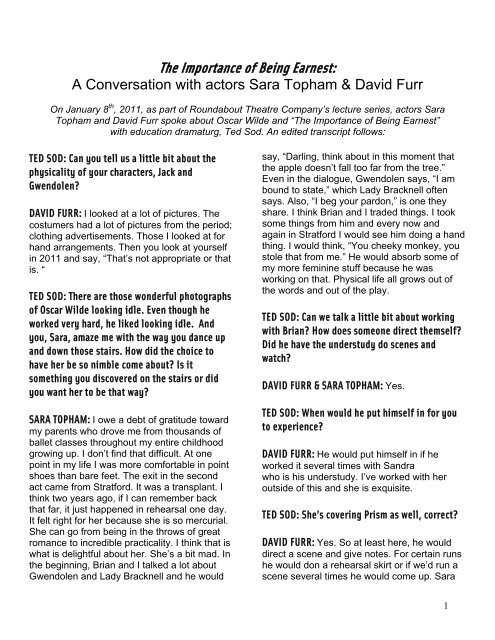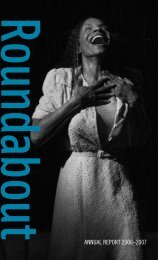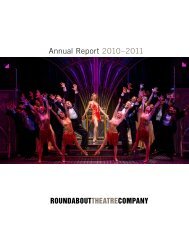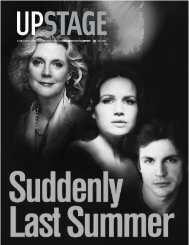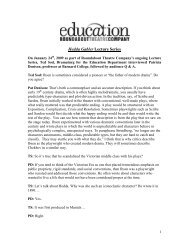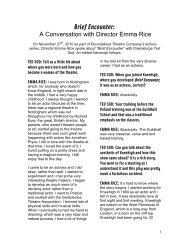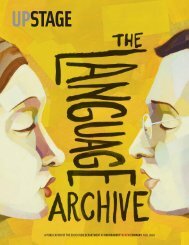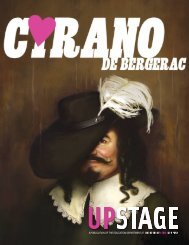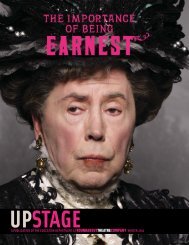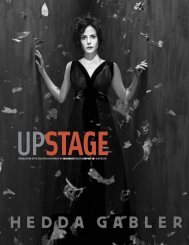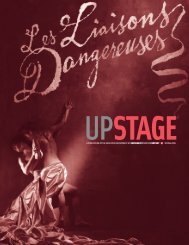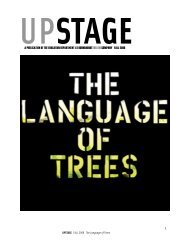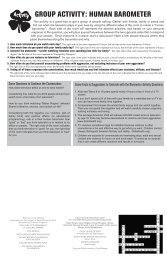The Importance of Being Earnest: - Roundabout Theatre Company
The Importance of Being Earnest: - Roundabout Theatre Company
The Importance of Being Earnest: - Roundabout Theatre Company
You also want an ePaper? Increase the reach of your titles
YUMPU automatically turns print PDFs into web optimized ePapers that Google loves.
<strong>The</strong> <strong>Importance</strong> <strong>of</strong> <strong>Being</strong> <strong>Earnest</strong>:<br />
A Conversation with actors Sara Topham & David Furr<br />
On January 8 th , 2011, as part <strong>of</strong> <strong>Roundabout</strong> <strong>The</strong>atre <strong>Company</strong>’s lecture series, actors Sara<br />
Topham and David Furr spoke about Oscar Wilde and “<strong>The</strong> <strong>Importance</strong> <strong>of</strong> <strong>Being</strong> <strong>Earnest</strong>”<br />
with education dramaturg, Ted Sod. An edited transcript follows:<br />
TED SOD: Can you tell us a little bit about the<br />
physicality <strong>of</strong> your characters, Jack and<br />
Gwendolen?<br />
DAVID FURR: I looked at a lot <strong>of</strong> pictures. <strong>The</strong><br />
costumers had a lot <strong>of</strong> pictures from the period;<br />
clothing advertisements. Those I looked at for<br />
hand arrangements. <strong>The</strong>n you look at yourself<br />
in 2011 and say, “That’s not appropriate or that<br />
is. “<br />
TED SOD: <strong>The</strong>re are those wonderful photographs<br />
<strong>of</strong> Oscar Wilde looking idle. Even though he<br />
worked very hard, he liked looking idle. And<br />
you, Sara, amaze me with the way you dance up<br />
and down those stairs. How did the choice to<br />
have her be so nimble come about? Is it<br />
something you discovered on the stairs or did<br />
you want her to be that way?<br />
SARA TOPHAM: I owe a debt <strong>of</strong> gratitude toward<br />
my parents who drove me from thousands <strong>of</strong><br />
ballet classes throughout my entire childhood<br />
growing up. I don’t find that difficult. At one<br />
point in my life I was more comfortable in point<br />
shoes than bare feet. <strong>The</strong> exit in the second<br />
act came from Stratford. It was a transplant. I<br />
think two years ago, if I can remember back<br />
that far, it just happened in rehearsal one day.<br />
It felt right for her because she is so mercurial.<br />
She can go from being in the throws <strong>of</strong> great<br />
romance to incredible practicality. I think that is<br />
what is delightful about her. She’s a bit mad. In<br />
the beginning, Brian and I talked a lot about<br />
Gwendolen and Lady Bracknell and he would<br />
say, “Darling, think about in this moment that<br />
the apple doesn’t fall too far from the tree.”<br />
Even in the dialogue, Gwendolen says, “I am<br />
bound to state,” which Lady Bracknell <strong>of</strong>ten<br />
says. Also, “I beg your pardon,” is one they<br />
share. I think Brian and I traded things. I took<br />
some things from him and every now and<br />
again in Stratford I would see him doing a hand<br />
thing. I would think, “You cheeky monkey, you<br />
stole that from me.” He would absorb some <strong>of</strong><br />
my more feminine stuff because he was<br />
working on that. Physical life all grows out <strong>of</strong><br />
the words and out <strong>of</strong> the play.<br />
TED SOD: Can we talk a little bit about working<br />
with Brian? How does someone direct themself?<br />
Did he have the understudy do scenes and<br />
watch?<br />
DAVID FURR & SARA TOPHAM: Yes.<br />
TED SOD: When would he put himself in for you<br />
to experience?<br />
DAVID FURR: He would put himself in if he<br />
worked it several times with Sandra<br />
who is his understudy. I’ve worked with her<br />
outside <strong>of</strong> this and she is exquisite.<br />
TED SOD: She’s covering Prism as well, correct?<br />
DAVID FURR: Yes. So at least here, he would<br />
direct a scene and give notes. For certain runs<br />
he would don a rehearsal skirt or if we’d run a<br />
scene several times he would come up. Sara<br />
1
will have to tell you more about the original<br />
process at Stratford because he probably did<br />
most <strong>of</strong> the heavy lifting on finding Lady<br />
Bracknell there.<br />
SARA TOPHAM: This is the seventh thing I’ve<br />
done with Brian; six <strong>of</strong> them he has been in<br />
and directed. I will never forget doing King<br />
Lear. He was playing King Lear and directing<br />
the play because he thought just playing King<br />
Lear wasn’t mad enough. I was playing<br />
Cordelia and at our first run through in<br />
the rehearsal hall, Brian’s lying on the<br />
floor dead and the stage manager,<br />
Michael Hart, comes over and says,<br />
“Brian, what would you like to happen<br />
now?” I remember thinking that no<br />
human being should have to play King<br />
Lear all the way through for the first<br />
time and then answer that question.<br />
But he did it. He is quite fantastic in<br />
that way. It does have challenges; for<br />
him and for us. He is <strong>of</strong>ten taking<br />
notes <strong>of</strong>f <strong>of</strong> a videotape <strong>of</strong> a show and<br />
sometimes it is a videotape <strong>of</strong> a<br />
Wednesday, you do two or three more shows<br />
and get notes on a Saturday. <strong>The</strong> notes are for<br />
four shows ago and that can be tricky. I think<br />
for him, not ever getting to sit out front with you<br />
guys and see it is difficult. He has an<br />
extraordinary assistant named Robert Beard<br />
who was a stage manager in New York for<br />
years and they have known each other for 40<br />
years. He is a great pair <strong>of</strong> eyes and ears.<br />
Even at Stratford when we did this there, Brian<br />
maybe rehearsed perhaps 15% or 20% more<br />
than here in New York but he did let the<br />
understudy do a lot <strong>of</strong> the rehearsing.<br />
DAVID FURR: And then stole everything.<br />
SARA TOPHAM: And then stole everything. Not<br />
really but he loves directing so much. He gets<br />
caught up in the directing and then goes, “God,<br />
I got to put a skirt on and rehearse.” I know<br />
very few people who could do it with the kind <strong>of</strong><br />
grace that he brings to it. It’s really not an easy<br />
thing to do.<br />
“What I<br />
thought was<br />
interesting<br />
was that in this<br />
case my<br />
director was<br />
also my scene<br />
partner.”<br />
-David Furr<br />
DAVID FURR: What I thought was interesting<br />
was that in this case my director was also my<br />
scene partner. It was really great and easy<br />
except for the fact that Lady Bracknell, for most<br />
<strong>of</strong> the play, is incredibly disdainful and<br />
disapproving <strong>of</strong> my character Jack. So here’s<br />
the director giving Jack a look <strong>of</strong> disgust and<br />
you can either interpret that as Lady Bracknell<br />
or interpret that as Brian thinking, “Is he really<br />
going to do that? Is that how he is going to play<br />
that?”<br />
SARA TOPHAM: I spent the whole <strong>of</strong> the<br />
first scene in King Lear during<br />
rehearsals thinking, “Oh my God! He<br />
hates me, he hates acting with me and<br />
he’s so mad at me right now!” Well, <strong>of</strong><br />
course he is. He’s King Lear. It’s a weird<br />
thing.<br />
DAVID FURR: I’d come <strong>of</strong>f stage and<br />
think, “He seemed awfully grave and<br />
disappointed,” and he’d say, “Now that<br />
went really well.”<br />
TED SOD: Talk to us about first cousins getting<br />
married during the Victorian period.<br />
DAVID FURR: I asked about that. I said, “Is<br />
Oscar Wilde doing something there or is it<br />
something he’s hoping you don’t notice?” I<br />
think Bob and Brian said he wasn’t being cute<br />
or anything like that. Of course nowadays you<br />
think, “Wait – let me do the math.”<br />
SARA TOPHAM: High school students have a<br />
really interesting response to that. <strong>The</strong>y think,<br />
“Hold up. Doesn’t that make them cousins?”<br />
TED SOD: As I understand it, it was called<br />
consanguinity and they encouraged it because it<br />
kept the money in the family. <strong>The</strong> first cousins<br />
were kept separated so that there wouldn’t be<br />
any onus on it. <strong>The</strong>y weren’t brought up<br />
together. Wilde is actually playing into that<br />
brilliantly by having you not know who each<br />
other is. <strong>The</strong>n in the 20 th century it fell out <strong>of</strong><br />
2
practice because <strong>of</strong> medical reasons, etc. But it<br />
was both an economic factor and status quo.<br />
SARA TOPHAM: I think it’s also that “blue blood”<br />
thing.<br />
TED SOD: I want to talk about is Wilde from your<br />
perspective. He wrote five plays to my counting.<br />
This one gets done quite <strong>of</strong>ten and the others<br />
occasionally: An Ideal Husband, Lady<br />
Windermere’s Fan, Salome and A Woman <strong>of</strong> No<br />
<strong>Importance</strong>.<br />
Is this the first Wilde you’ve both been in?<br />
SARA TOPHAM: No. Two years before we did<br />
<strong>Earnest</strong>, I played Mabel Chiltern in An Ideal<br />
Husband which was great preparation for<br />
playing Gwendolen. I think Mabel is<br />
somewhere in between Cecily and Gwendolen.<br />
I think she’s terrific; such fun.<br />
TED SOD: Our audience may know that Wilde’s<br />
life more or less fell apart while this play was<br />
running in 1895. <strong>The</strong>re was a libel suit which he<br />
was encouraged to press against the Marquess<br />
<strong>of</strong> Queensbury because he was infatuated with<br />
his son, Lord Alfred Douglas. That turned into a<br />
trial against Wilde where he was convicted <strong>of</strong><br />
gross indecency at the time and murdered, I<br />
think. He was sent to prison for two years hard<br />
labor. He came out <strong>of</strong> prison destitute and his<br />
family was taken away from him since his wife<br />
wouldn’t allow him to see his children. If you are<br />
interested, there is a biography written by<br />
Richard Ellmann which won the Pulitzer Prize and<br />
a film entitled Wilde made in the late 90s that<br />
uses some <strong>of</strong> the info in that book. What do you<br />
two make <strong>of</strong> Wilde? Many <strong>of</strong> us see him as a<br />
genius. Do you think that word is used too easily<br />
in this case?<br />
SARA TOPHAM: Oh no.<br />
DAVID FURR: No, I don’t think so. I get the<br />
impression, and Brian could certainly tell you<br />
more from the one-man show that he does<br />
about Wilde, that his mind was able to come up<br />
with these things just sitting around. So I don’t<br />
think genius is too strong a word. He was wellknown<br />
before he wrote anything. He was<br />
known for being a wit. Before he wrote much,<br />
he gave lectures. That necessarily doesn’t pay<br />
the bills but it was perfect for him.<br />
TED SOD: Close to the end <strong>of</strong> his education at<br />
Oxford, he came to America and travelled to the<br />
Wild West to lecture on interior decoration. He<br />
was parodied in some magazines; but I think it<br />
was at that point that he made the statement<br />
that “America is the only country that went from<br />
barbarism to decadence without civilization in<br />
between.”<br />
SARA TOPHAM: I think that’s also the trip where<br />
he said the famous line, “I have nothing to<br />
declare except my genius.” Along with that<br />
biography you mentioned, his letters, which are<br />
the bulk <strong>of</strong> Brian’s one-man show, are<br />
extraordinary. He writes from prison about the<br />
treatment <strong>of</strong> children and was hugely impactful<br />
in prison reform in England. If you have an<br />
afternoon on a rainy October Sunday and<br />
nothing else to do, I highly recommend you<br />
read De Pr<strong>of</strong>undis which is the core thing he<br />
wrote from jail. For me, what makes him a<br />
genius is that he could write that and also this<br />
play. <strong>The</strong>re’s something about his pr<strong>of</strong>ound<br />
speaking <strong>of</strong> the truth in both the mediums<br />
which I find amazing. You’re certainly right that<br />
this play probably gets done maybe 75% more<br />
<strong>of</strong>ten than any <strong>of</strong> his other plays he wrote, but<br />
it is at least that much better. <strong>The</strong>re are great<br />
things in the other plays but none <strong>of</strong> them<br />
structurally hold together the way this one<br />
does. We may owe that to George Alexander<br />
who was the first producer and played Jack.<br />
TED SOD: <strong>The</strong>re was a fourth act. I think it’s<br />
about debts?<br />
3
SARA TOPHAM: Yes. I’ve seen the fourth act and<br />
I don’t recommend it.<br />
DAVID FURR: Yes. <strong>The</strong>re’s a solicitor that comes<br />
to arrest Ernest because <strong>of</strong> his debts in London<br />
that Jack has driven up. He comes to the<br />
house in the country to take in Ernest but the<br />
person who is parading as Ernest here is Algy.<br />
<strong>The</strong>n Jack is like, “Well, good luck.” Finally he<br />
writes a check to save him but it is this whole<br />
tangent basically.<br />
TED SOD: It is now the audience’s turn to ask<br />
questions.<br />
AUDIENCE QUESTION #1: First <strong>of</strong> all,<br />
the play is excellent. I really enjoyed<br />
it a great deal. What do you do<br />
between the time that you are called<br />
to audition and the time you get a<br />
role in a play? Do you wait? Do you<br />
take on another assignment?<br />
DAVID FURR: That’s a really<br />
interesting and potentially difficult<br />
question to answer. I was scheduled<br />
to go to L.A. for a month. I<br />
auditioned for <strong>Earnest</strong> in July and<br />
didn’t start rehearsals until November.<br />
Between July and November, I had been<br />
<strong>of</strong>fered and accepted this job I really wanted to<br />
do. My manager in L.A. wanted to start to<br />
submit me for television shows and things that<br />
started taping in November or December. You<br />
have to think about what you really want to do.<br />
You might make more money doing a<br />
television show. I personally really wanted to<br />
do this show so I told my agent that this was a<br />
big deal to me. You have to prioritize.<br />
“<strong>The</strong>atre dreams<br />
for me are<br />
usually the bad<br />
kind. For<br />
example, I’m in<br />
my costume and<br />
I know my lines<br />
but for some<br />
reason can’t get<br />
to the stage.”<br />
- Sara Topham<br />
Broadway and all the Canadian cast is going.”<br />
Everybody was like, “We’re going to<br />
Broadway!” and then Brian had to call us and<br />
say, “That’s not quite how it’s going to work.” I<br />
found out in August that I was going to come in<br />
November. Some <strong>of</strong> the other people had<br />
actually turned down work for the winter. You<br />
have to make the best choice you can.<br />
TED SOD: You have to have nerves <strong>of</strong> steel too.<br />
As many <strong>of</strong> you know, this pr<strong>of</strong>ession is<br />
incredibly difficult. <strong>The</strong>se wonderful actors have<br />
to stay in shape. <strong>The</strong>y can’t be idle when they’re<br />
not working. <strong>The</strong>y have to continue with classes<br />
and voice work; everything it takes to be<br />
ready to do a play <strong>of</strong> this difficulty.<br />
AUDIENCE QUESTION #2: Does the age and<br />
composition <strong>of</strong> the audience have an<br />
effect on your performance? Also, when<br />
you are putting yourselves into a<br />
character, do you dream <strong>of</strong> what your<br />
character is doing?<br />
SARA TOPHAM: <strong>The</strong>atre dreams for me<br />
are usually the bad kind. For example,<br />
I’m in my costume and I know my lines<br />
but for some reason can’t get to the<br />
stage. Every time I open a door I’m in a train<br />
station or a shopping mall. If I get to the stage,<br />
I’m doing a different play than the one I think<br />
I’m supposed to be doing. I get those kinds <strong>of</strong><br />
dreams. To answer your question about the<br />
audience, I worked in Canada with an amazing<br />
man named William Hutt. He was in the first<br />
season ever at Stratford Festival in 1953 with<br />
Alec Guinness and Irene Worth.<br />
TED SOD: And he played Lady Bracknell.<br />
SARA TOPHAM: That’s why I think you have to<br />
have good people around you. I have a<br />
wonderful agent who gives me great advice.<br />
For us, it was very weird because we closed in<br />
Stratford in the fall <strong>of</strong> 2009 and in January<br />
2010 the paper read, “<strong>Earnest</strong> going to<br />
SARA TOPHAM: And he famously played Lady<br />
Bracknell, yes. He said to me once, “You have<br />
to ask yourself who the audience is. Are they a<br />
bunch <strong>of</strong> people who have come here to judge<br />
whether or not you are a good or bad actor? Or<br />
are they a dear, dear friend who you haven’t<br />
4
had a visit with in a long time and you are so<br />
happy to see them.” I always try to pick the<br />
latter because it’s less scary. I think for me<br />
psychologically, if I put the responsibility <strong>of</strong><br />
having a good time in your hands, it doesn’t<br />
seem fair to me. I’m getting paid so I feel like<br />
it’s my own responsibility to have a good time.<br />
When you do that, when you are the creator <strong>of</strong><br />
your own joy, what happens is that <strong>of</strong>ten<br />
audiences will go, “I’d like a piece <strong>of</strong> that.<br />
Thank you.”<br />
AUDIENCE QUESTION #4: In general, what is the<br />
reaction <strong>of</strong> the actors onstage when a well<br />
known personality appears and the audience<br />
applauds?<br />
TED SOD: Entrance applause is a very interesting<br />
thing. It usually comes with a career that has<br />
gone on for decades. What do you both make <strong>of</strong><br />
it?<br />
TED SOD: What do you think Dave?<br />
DAVID FURR: I think there is a<br />
difference between the older and<br />
younger audiences. We’ll have<br />
audiences that are filled with older<br />
people that are quite responsive.<br />
For us, it’s more <strong>of</strong> what kind <strong>of</strong><br />
energy we are getting from the<br />
audience and whether it can feed<br />
us or lift us to have an even better<br />
time. If it is not as much energy<br />
from the audience then we’ll enjoy<br />
each other on stage and enjoy<br />
what were doing for its own sake.<br />
AUDIENCE QUESTION #3: As many<br />
times as I’ve read the play, I’ve<br />
never quite understood what Gwendolen meant<br />
when she said to Jack, “I intend to develop in<br />
many directions.” What’s your take on that?<br />
“For us, it’s<br />
more <strong>of</strong> what<br />
kind <strong>of</strong> energy<br />
we are getting<br />
from the<br />
audience and<br />
whether it can<br />
feed us or lift us<br />
to have an even<br />
better time.”<br />
- David Furr<br />
DAVID FURR: It does have its challenges but I<br />
think the good thing is, not to jinx it, that in<br />
certain situations you can almost count on<br />
it. You build that into the character’s<br />
thinking. In this case, Brian comes on with<br />
applause and I can peek around to<br />
think,”Oh, Lady Bracknell is here.”<br />
SARA TOPHAM: You have to give yourself<br />
something to think to keep the play alive.<br />
DAVID FURR: It’s as if there’s a huge<br />
pause in the play. As a character, you fill<br />
the pause with more thinking. Lady<br />
Bracknell leaves and I have to have a<br />
couple <strong>of</strong> moments <strong>of</strong> complete and<br />
udder distress before Algy plays the<br />
Wedding March. You fill that with whatever is<br />
actually happening. I think the bigger challenge<br />
is if entrance applause is not there.<br />
SARA TOPHAM: If it’s erratic it is challenging.<br />
SARA TOPHAM: Well, I’m not sure I should say it<br />
out loud in front <strong>of</strong> him. Sometimes you have to<br />
have a secret. I think for me it’s different things<br />
almost everyday. It depends on what comes at<br />
me when I first come out. When he first speaks<br />
to me, sometimes it triggers a thought and I<br />
just go with whatever that is. Essentially, I think<br />
what she means is, “If you think I’m fabulous<br />
now, just you wait.” Honestly and truly, it’s<br />
different every single day as to what particular<br />
direction she’s leaning to in that moment. It<br />
comes out <strong>of</strong> the vibrations.<br />
DAVID FURR: I’ve been in shows when there<br />
was applause and all <strong>of</strong> the sudden there’s<br />
nothing. It’s harder for that actor and there’s a<br />
moment <strong>of</strong>, “Right and moving on.”<br />
SARA TOPHAM: In my opinion, I think it would be<br />
bad form to milk that applause ham- fistedly<br />
and I think in this production we don’t have<br />
milking going on. It would be almost impossible<br />
for Brian to stop that entrance round. When we<br />
did King Lear, he very deliberately entered not<br />
from the stage but from the back <strong>of</strong> the house<br />
5
to try and eliminate that possibility. Sometimes<br />
he succeeded.<br />
DAVID FURR: I was covering in a show and<br />
there were four characters. <strong>The</strong> two older<br />
actors would get entrance applause and the<br />
two younger were actors we haven’t much<br />
seen yet. All four <strong>of</strong> the actors ending up<br />
getting Tony nominations. <strong>The</strong> day the Tony<br />
nominations came out, the door opens, there’s<br />
the young couple and all <strong>of</strong> the sudden there’s<br />
this applause. <strong>The</strong> next day there was not.<br />
TED SOD: Sometimes the audience will give<br />
applause to the scenery. I think it’s a fascinating<br />
question from the actor’s perspective but from<br />
the audience’s perspective, I think it is a way for<br />
them to acknowledge how wonderful the actors<br />
are and to thank them for being back on stage.<br />
It’s a valentine really; the way the audience<br />
sends a valentine.<br />
SARA TOPHAM: And we’re lucky in this play<br />
because this play is structurally less damaged<br />
by entrance and exit applause. We have the<br />
footlights and there’s a meta-theatrical thing<br />
about it. In King Lear, Brian didn’t want<br />
applause like that because he felt it would<br />
damage the structure <strong>of</strong> the play. I can’t speak<br />
to what it would be like in a Tennessee<br />
Williams play but I can’t help feeling <strong>The</strong> Glass<br />
Menagerie would be damaged by an entrance<br />
round but maybe I’m wrong. Maybe it works; I<br />
don’t know.<br />
6


